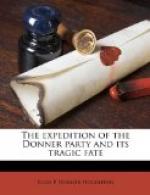FRIEDRICH VON LOGAU.
I
ARTICLES PUBLISHED IN The California Star—STATISTICS OF THE PARTY—NOTES OF AGUILLA GLOVER—EXTRACT FROM THORNTON—RECOLLECTIONS OF JOHN BAPTISTE TRUBODE.
In honor to the State that cherishes the landmark; in justice to history which is entitled to the truth; in sympathetic fellowship with those who survived the disaster; and in reverent memory of those who suffered and died in the snow-bound camps of the Sierra Nevadas, I refute the charges of cruelty, selfishness, and inhumanity which have been ascribed to the Donner Party.
In this Appendix I set forth some of the unwarranted statements to which frequent reference has been made in the foregoing pages, that they may be examined and analyzed, and their utter unreliability demonstrated by comparison with established facts and figures. These latter data, for the sake of brevity, are in somewhat statistical form. A few further incidents, which I did not learn of or understand until long after they occurred, are also related.
The accounts of weather conditions, of scarcity of food and fuel, also the number of deaths in the camps before the first of March, 1847, are verified by the carefully kept “Diary of Patrick Breen, One of the Donner Party,” which has recently been published by the Academy of Pacific Coast History.
The following article, which originally appeared in The California Star, April 10, 1847, is here quoted from “The Life and Days of General John A. Sutter,” by T.J. Schoonover:
A more shocking scene cannot be imagined than was witnessed by the party of men who went to the relief of the unfortunate emigrants in the California Mountains. The bones of those who had died and been devoured by the miserable ones that still survived were around their tents and cabins; bodies of men, women, and children with half the flesh torn from them lay on every side. A woman sat by the side of the body of her dead husband cutting out his tongue; the heart she had already taken out, broiled, and eaten. The daughter was seen eating the father; and the mother, that [viz. body] of her children; children, that of father and mother. The emaciated, wild, and ghastly appearance of the survivors added to the horror of it. Language can not describe the awful change that a few weeks of dire suffering had wrought in the minds of the wretched and pitiable beings. Those who one month before would have shuddered and sickened at the thought of eating human flesh, or of killing their companions and relatives to preserve their own lives, now looked upon the opportunity the acts afforded them of escaping the most dreadful of deaths as providential interference in their behalf.
Calculations were coldly made, as they sat around their gloomy camp fires, for the next succeeding meals. Various expedients were devised




